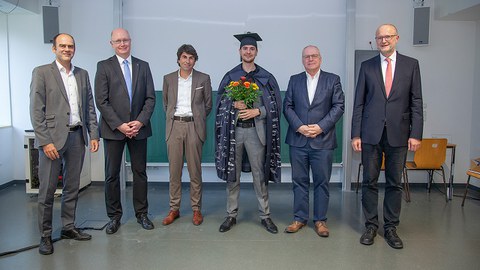Nov 01, 2021
Promotion Oliver Mosig

Dipl.-Ing. Oliver Mosig and the doctoral committee
On 18.10.2021, Mr Oliver Mosig successfully defended his scientific thesis within the framework of the doctoral procedure with the topic "Influence of pores and pore water on the increase in strength of concrete under high strain rates".
The increase of concrete strength under increasing loading rates has been the focus of re-search for more than 100 years. So far, a large number of possible explanations for the so-called strain rate effect have been identified. Of these, the heterogeneity of the concrete is generally assumed to be a major cause. The heterogeneity of concrete results from the aggregates embedded in the hardened cement paste, but also from air and water pores enclosed in it, which are the main subject of this work.
The extent to which existing pore water influences the strength increase of concrete under high loading rates was investigated. Experimental tests in a hydraulic testing machine and dynamic tests in the split HOPKINSON bar on various concretes showed that existing pore water significantly reduces the static and dynamic compressive strength of concrete in the same way. This decrease in concrete compressive strength can be considered to be independent of the loading rate.
Furthermore, numerical investigations were carried out on the influence of pores on the propagation of loading waves. The focus was both on the global wave propagation behavior in a porous structure and the local wave refraction at a single pore. Additionally, the influence of the pore medium (air or water) was studied. It could be shown that existing pores reduce the wave propagation velocity and that the ratio of pore size to wavelength is a significant influencing factor for the transient stress distribution in the pore region. In particular, a reduction of the local notch stresses at the pore edge was observed with decreasing wavelengths, which can result in strength-increasing effects.
In addition to the chairman of the doctoral committee, Prof. Dr.-Ing. habil. Ivo Herle (Technische Universität Dresden), Prof. Dr.-Ing. Dr.-Ing. E.h. Manfred Curbach (Technische Universität Dresden), Prof. Dr.-Ing. Thomas Braml (Universität der Bundeswehr München) and Prof. Dr.-Ing. Stefan Löhnert (Technische Universität Dresden) were present as reviewers. Another member of the doctoral committee was Prof. Dr.-Ing. Steffen Marx (Technische Universität Dresden).
We warmly congratulate Mr Oliver Mosig on completing his doctorate and wish him all the best and much success for his future career.
